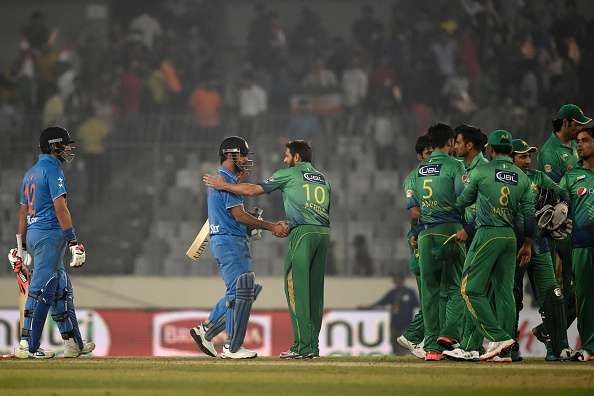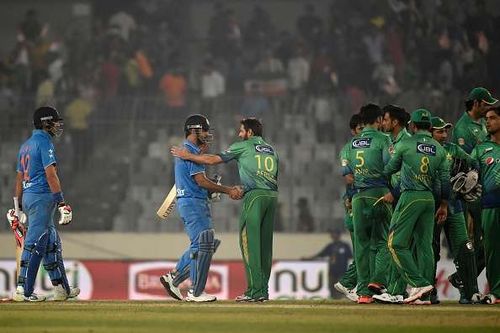
Looking ahead to the India vs Pakistan match in Kolkata: What makes this rivalry so special?

As players we are often asked what it means to play against Pakistan. How is this match-up different from all others, how much additional pressure do we face in the hours leading up to the game, what do we do differently to prepare for the intense on-field battle?
Truth be told though, the players have become accustomed to the pressure. While the media would like everyone to believe that every India-Pakistan match is a matter of life and death, the reality is something different – at least in the last 10 years or so.
There was a time when India vs Pakistan DID mean something much more than a game. When Chetan Sharma was hit for that famous six by Javed Miandad back in 1986, it almost destroyed Chetan's career. The cross-border rivalry inspired extreme reactions back then, and the pressure used to be huge.
But the advent of T20 cricket has changed things. With so much cricket being played, and that too at such a fast clip, it's easier for players to put disastrous performances behind them.
Stuart Broad was handed the ultimate humiliation by Yuvraj Singh when he was hit for 6 sixes in an over at the 2007 World T20, but the Englishman didn't let that affect him too greatly. He moved on from that setback to become one of the best fast bowlers in the world, even leading the national side in T20 cricket. Today, nine years down the line, he's still playing some wonderful cricket for England, with that painful over having been put firmly in the rearview mirror.
The fans have become more understanding too, a few isolated incidents of hate notwithstanding. They are more willing to tolerate mistakes, even in an India-Pakistan match, because they see their heroes giving it their all day in and day out.
Of course, there is still tremendous pressure on the players to avoid making huge blunders in an Indo-Pak clash. An Indian fielder dropping an easy catch of Shahid Afridi is still a matter of grave concern; no one wants to let the team down like that. But by and large, the atmosphere leading up to this legendary match-up is much more relaxed now than it used to be earlier.
Perhaps I am more inclined to say that because I lie on this side of the border. The Indian cricket team has raced ahead of the Pakistani one in recent times; they have much more match-winners in the team, and that has translated into considerably more success on the global stage.
Pakistan did field some very great teams in the past. I remember when India toured Pakistan in 2004, there were some fantastic players in the side – the likes of Inzamam-ul-Haq, Shoaib Akhtar, Saqlain Mushtaq and Mohammad Yousuf were incredibly tough players to face. But their team now is nowhere close to the class that they had a decade ago.
That is partly down to the troubles that Pakistani cricket has been having internally. The domestic circuit is not in the best shape, and the team combination changes far too frequently. A player like Ahmed Shehzad, who played brilliantly against Bangladesh, was dropped during the Asia Cup because of poor form. That just shows how difficult arriving at a winning combination has been for Pakistan.
By contrast, India's domestic scene is much more settled. More importantly though, the Indian players have been playing extensively in the IPL, which has helped toughen them up big time. With so many IPL matches taking place every year, Indian cricketers are more used to the high-stakes atmosphere of a big game. They have developed strong hearts and the ability to withstand pressure – which are huge assets in international cricket.
Politics, protests and pitches – how do the players deal with all the excess baggage?
Honestly, things like protests and change of venue don't affect the players all that much. They are so set in their preparation routines and habits, that it doesn't matter to them whether they are playing in Dharamsala or Kolkata.
Yes, someone threatening to dig up the Eden Gardens pitch does leave a bad taste in everyone's mouth, but that is a small distraction. At the end of the day, the pressure of playing according to the tournament's situation is still the most significant. And that's one area where Pakistan currently have an edge over India.
It's no secret that the confidence of the Indian players has taken a hit after our loss to New Zealand. If India lose against Pakistan, we are practically going to be eliminated from the World T20. That's some serious pressure.
The pitch was the talk of the town after the New Zealand match, and it's true that the tremendous turn that it provided was not conducive to the Indian batsmen. The curator tried to create a pitch that would assist the Indian spinners, but by facilitating that extra turn for the Kiwi spinners, we ourselves fell into the web that we had tried to weave.
There was a time when Indians couldn't possibly be threatened by spin. Sachin Tendulkar, Virender Sehwag, Rahul Dravid, VVS Laxman – they were all masters of the turning ball, because they had grown up on pitches that assisted spin. Now, however, the domestic pitches are a lot greener and quicker, which is why the current Indian batsmen all prefer the ball coming on to the bat with more pace.
Virat Kohli, Shikhar Dhawan and Rohit Sharma like to play the ball on the rise, which means they struggle on pitches that turn square. That said, it probably wasn't the curator's intention to make a pitch that turned square – pitch preparation is not an exact science, and the curator is not God; he can make mistakes sometimes.
To be honest, very rarely can a curator accurately predict how a pitch will behave. The intention ahead of the Nagpur game may have been to create a slow pitch that assisted spinners, and to that end the curator probably shaved off all the grass and tried to ensure a moisture-free wicket. But even he couldn't have anticipated the sharp turn that the pitch would produce; a curator's accuracy in predicting the behaviour of a pitch is about 50%, based on my experience.
That said, the way New Zealand and Kane Williamson read the conditions deserves to be applauded. Leaving out Trent Boult and Tim Southee in favour of inexperienced bowlers like Mitchell Santner and Ish Sodhi was a big risk, and it paid off.
A high-scoring game awaits in Kolkata
The outfield at Eden Gardens is quick, as we saw in the Pakistan-Bangladesh match, and the pitch will be a lot more sporting than the one in Nagpur. I fully expect a high-scoring encounter in Kolkata, with a great battle between India's prolific batsmen and Pakistan's fiery pacers.
To say that Pakistan would be coming in riding high on confidence would be an understatement. Shahid Afridi led by example in their opening game, and that would have given the whole team a huge boost. Afridi has been known to shield himself by batting at No. 6 or lower, but by promoting himself to No. 4 against Bangladesh he took a leaf out of MS Dhoni's book (in particular, the 2011 World Cup final) – and that can only be good news for the Pakistani team.
Pakistan's batting suddenly looks a lot better with Afridi leading from the front. And while their fielding may still be thoroughly unimpressive, their bowling remains as strong as ever. With three quick left-armers who are capable of generating tremendous swing and uncomfortable angles, Pakistan's bowling attack can definitely pose more than a few questions to the Indian batsmen.
India, on the other hand, are coming off that forgettable match against New Zealand, and conventional wisdom would suggest they will struggle to bring their best in Kolkata. But Dhoni is known as a great captain for a reason – there's no one better at putting a disastrous result behind than Mahi.
He has a knack for bouncing back spectacularly from defeat; whenever the team suffers a bad loss, Dhoni ensures that the players don't dwell on it. By the time the team enters the bus to go back to the hotel, they would have moved on from the loss, instead looking ahead to the matches coming up.
Prediction: Dhoni's leadership, coupled with the hunger among the Indian players to prove that they are the best, would pip the scales in the home team's favour. Besides, India's record against Pakistan in ICC world championships remains flawless, and the pressure of overcoming that unflattering statistic would likely prove too tough for Pakistan. I predict that India will come away with the win in Kolkata.
Also published on Mohammad Kaif's blog here.